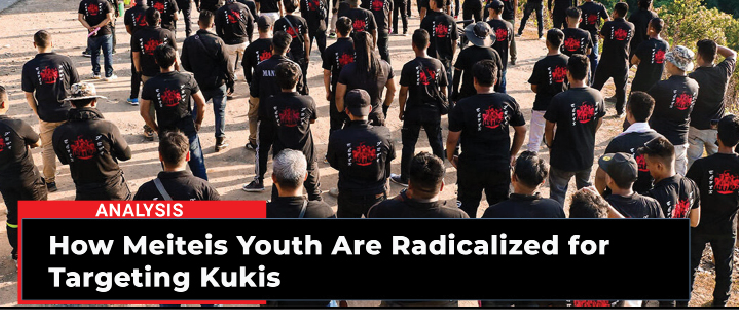
While the Meitei media and politicians have long harped on the supposed dangers of the alleged Narco-Terrorism activity of the Kukis in Manipur, we are now witnessing the turbocharged expression of a reality the state has never confronted: the radicalisation of Meitei youth.
It is an everyday radicalisation of young men and women who appear very normal, until they decide to target minority Kukis.
They are part of public, over-ground groups like the Arambai Tenggol and Meitei Leepun, the unofficial armed militia of the state Chief Minister N. Biren Singh and Rajya Sabha and Titular King Leishemba Sanajaoba. All of them enjoyed the patronage of the current dispensation, giving them political clout and a veneer of respectability. Members of these groups have been involved in numerous cases of physical violence against the Kukis during the initial stage of violence, and now even to their own kindred men.
The recent incident at Tengnoupal district also highlights how the vulnerable Meitei youths are lured to join a militant outfit on the pretext of serving their motherland. The bodies of 13 men recovered after a gunfight in Manipur’s Tengnoupal district on December 4 morning were found more than 100 kilometres from their homes, with their families disclosing that they were not aware under what circumstances they had reached the location.
According to a report in The Indian Express, security forces had found the bullet-riddled bodies of the 13 Meitei men in Leithu – a forested area not far from the Myanmar border – on Monday after receiving inputs of a gunfight in the area around 10.30 am. The bodies were taken to the Jawaharlal Nehru Institute of Medical Sciences in Imphal East, and on Tuesday, their identities were established. According to officials, the men are aged between 17 and 47, and come from valley districts of Bishnupur, Imphal West, Imphal East and Kakching.
The younger sister of one of the victims said their family had been displaced from Torbung – at the border of Meitei-dominated Bishnupur and Kuki dominated Churachandpur district, one of the first places where violence had erupted on May 3, and had moved to a relief camp in Thangmeiband in Imphal West district. She said that he left soon after they shifted to the relief camp, and the family has not seen him since.
“He sought blessings from my mother to be victorious and fight for our motherland before leaving. We spoke over the phone several days back; he said that he wanted to meet me and mother,” she said, adding that she was not aware of his whereabouts. The families of some of the other men said they had left home a few days before the incident.
Another woman, sister of one of the 13 victims said that since the start of the violence, her brother would often be away from their home in Imphal East, saying that he was volunteering to help those in need, which is why she did not suspect anything when he left home two days before the incident.
She said that she came to know about the incident after seeing a report on social media about the death of 13 Meiteis.
“After we came to know that one of the victims was from Khurai area, our family tried calling my brother, but his phone was switched off. We contacted some of his friends to ask about his whereabouts. They said he and some volunteers move around frequently helping people affected by the conflict. I prayed that my brother wasn’t part of the group. Unfortunately, our worst nightmare came true after we visited the morgue. I was speechless and shocked after seeing his body,” she said.
The elder brother of one of the victims shared a similar account, saying his brother often did odd jobs and participated in “community activities”. “He left home a week ago and as usual we thought he was out doing voluntary work or looking for work,” he said.
There were many reports of missing cases among the valley community, many of their whereabouts are not known by their family members. Their families were consoled with the pretext of waging war against the Kukis and that they were posted at the buffer zone areas.
These young Meiteis see that violence against Kukis is often celebrated or at least tolerated at the moment, sometimes approvingly, by their families and society. They observe that people who provoke and lead violence gain social and political respectability, as practiced at the moment by some of their Social Workers. They see that far from suffering consequences for hate speech and hate crimes, anti-Kuki acts help those who carry them out.
Unfortunately, the radicalisation of Meitei youth often goes unnoticed as it is approved by their families, whom they see indulging in a range of aggressions against Kukis; and it is absurd that Meitei mothers who sent their sons away to kill other sons cry when Karma hits them back. It’s a painful travesty.
Yet while their politicians might benefit politically, the long-term consequences of this project will be borne by Meiteis too. The radicalized group is now acting as a Moral Police – intimidating, thrashing, and silencing the voice of truth speakers. The Meitei intelligentsias are now maintaining a stoic silence over the evils of their society fearing reprimandation from them. This in the long run will surely ruin the fabric of the Meitei society. Once hatred or radicalization is normalised, violence follows naturally.

Thingkho Le Malcha (TLM) is a traditional method of communication used to send out messages across the Kuki hills during the Anglo-Kuki War,1917-1919... more

If you would like to received a free softcopy of Thingkho le Malcha, you can follow our Whatsapp and Telegram by clicking the below links.
For any other media related you can contact us using below email